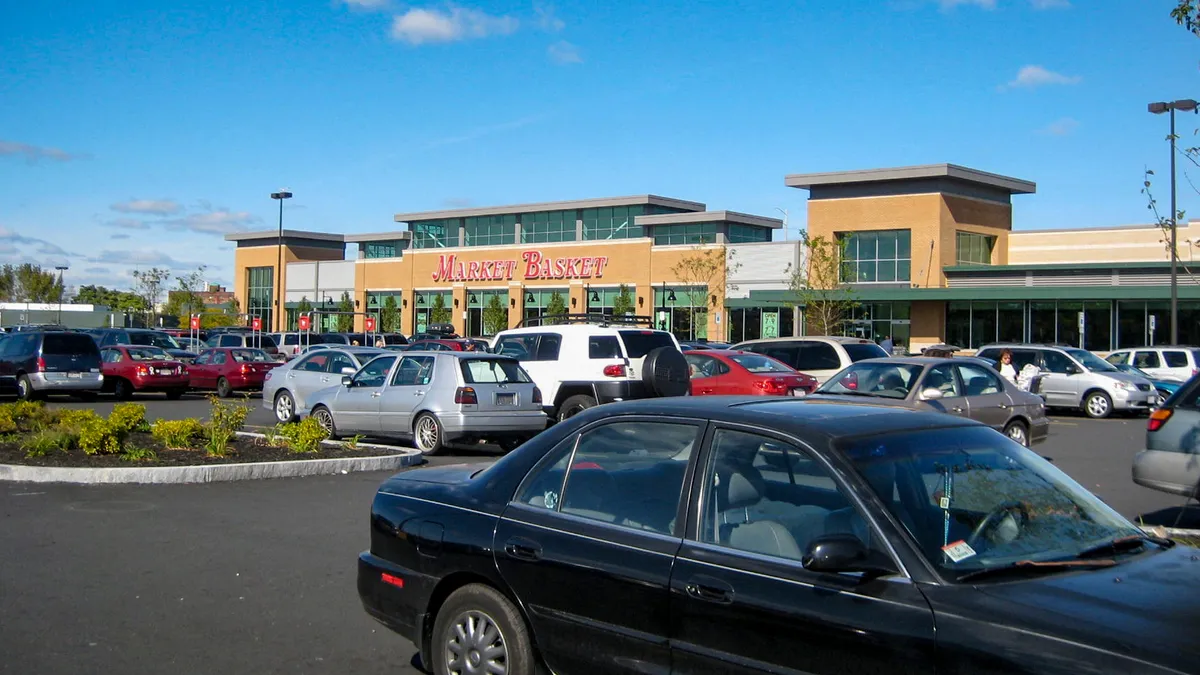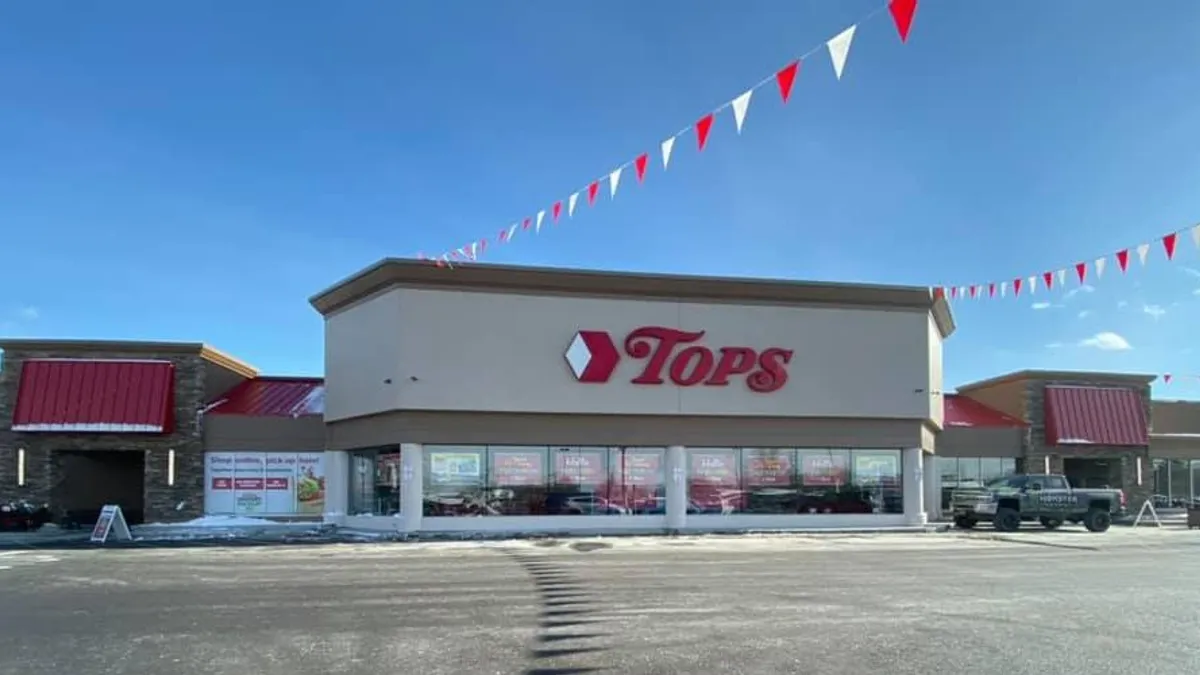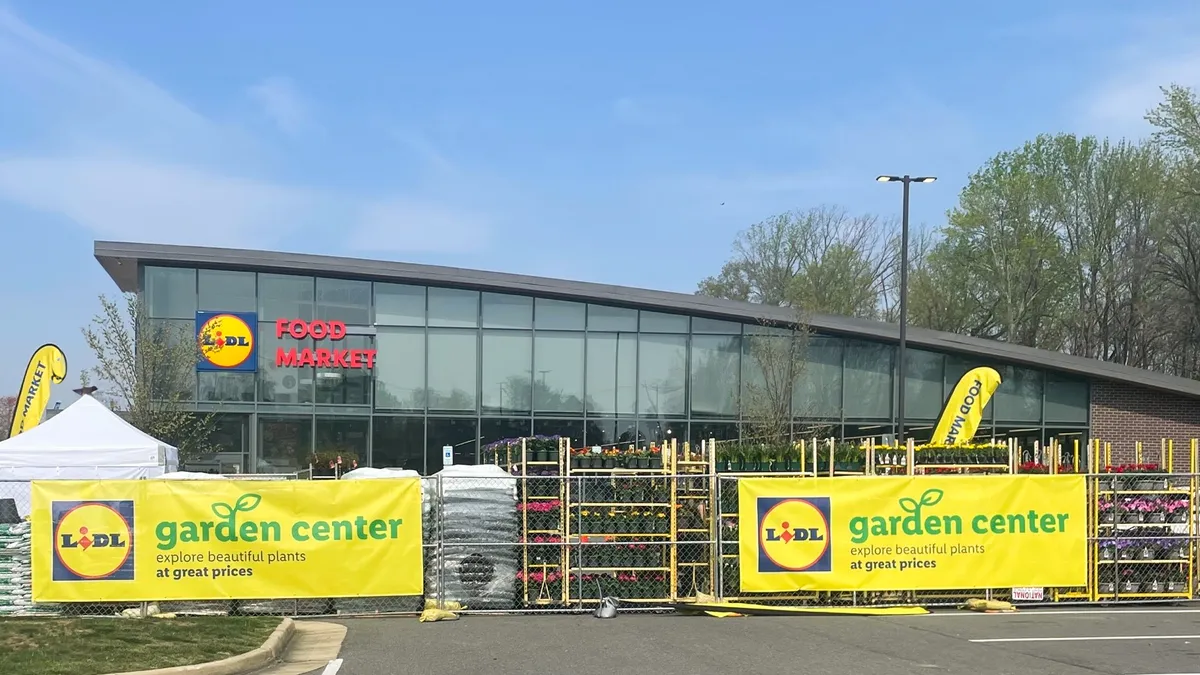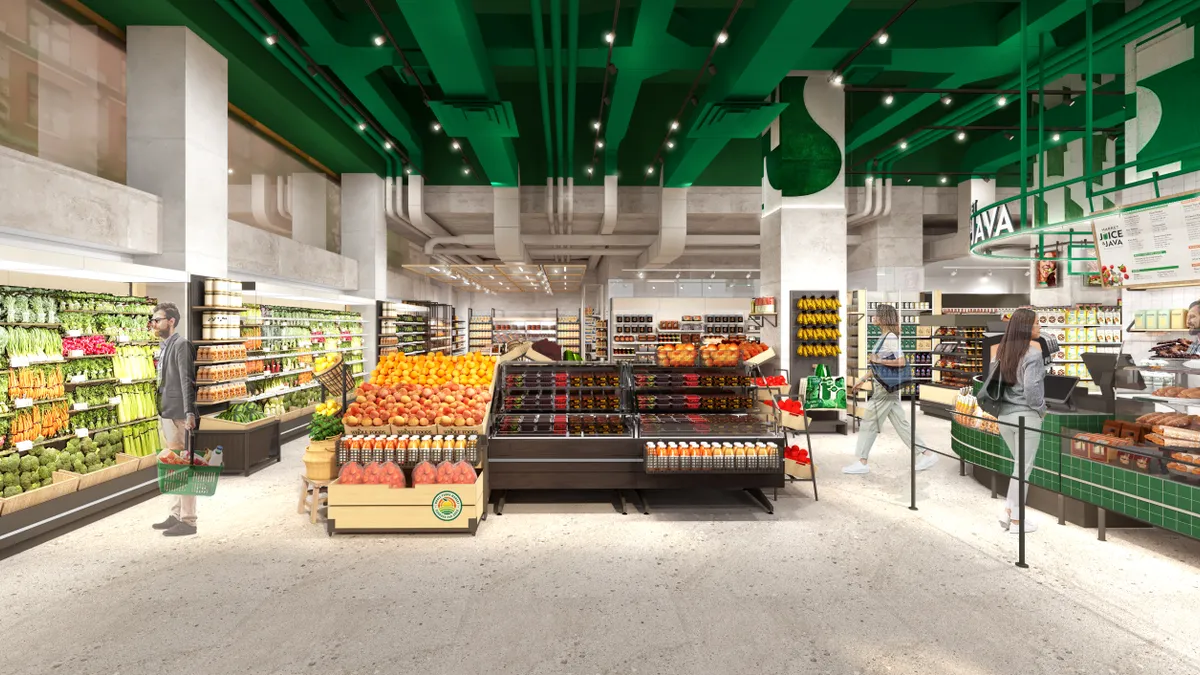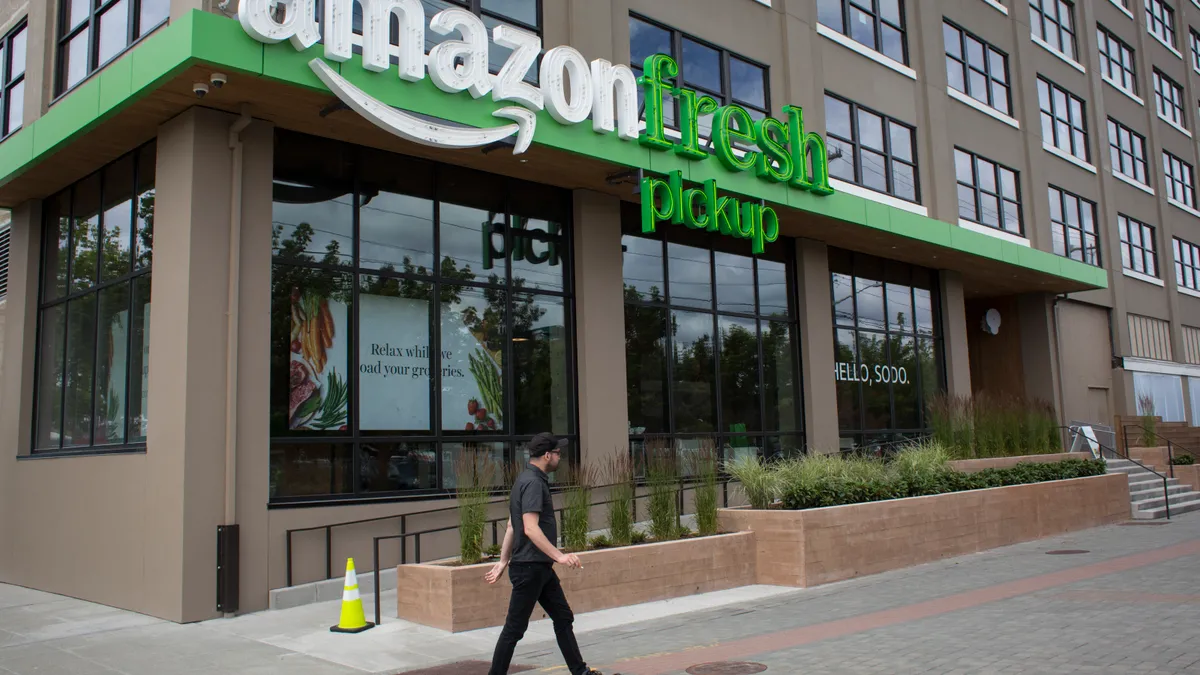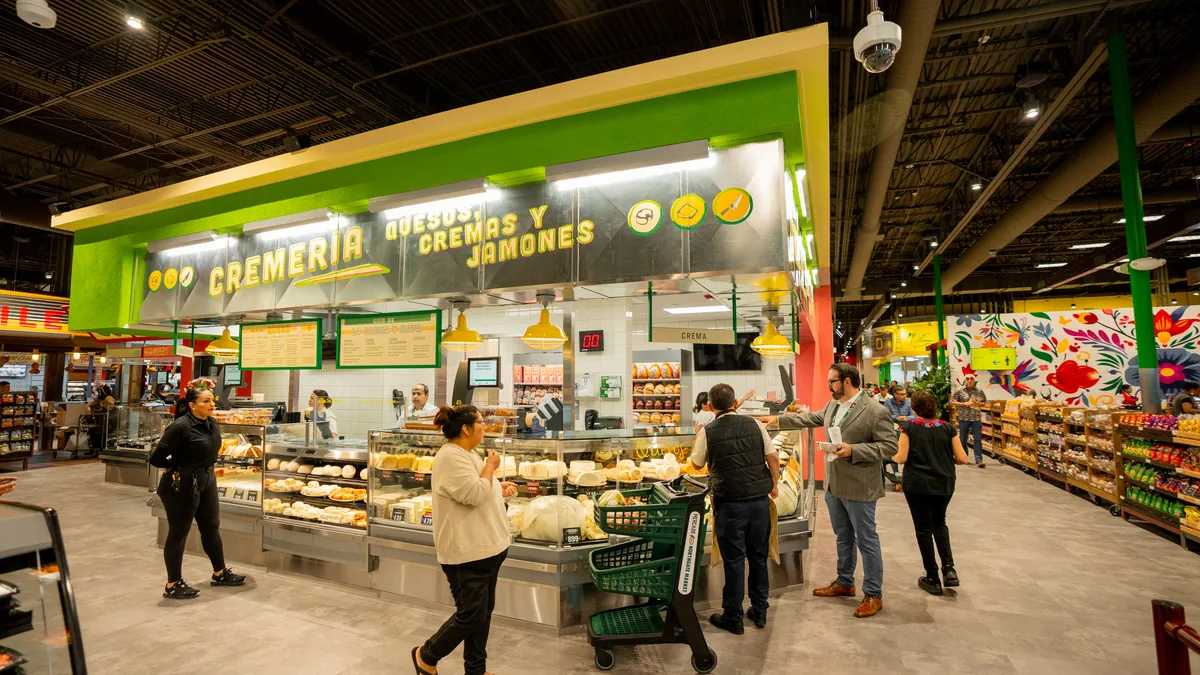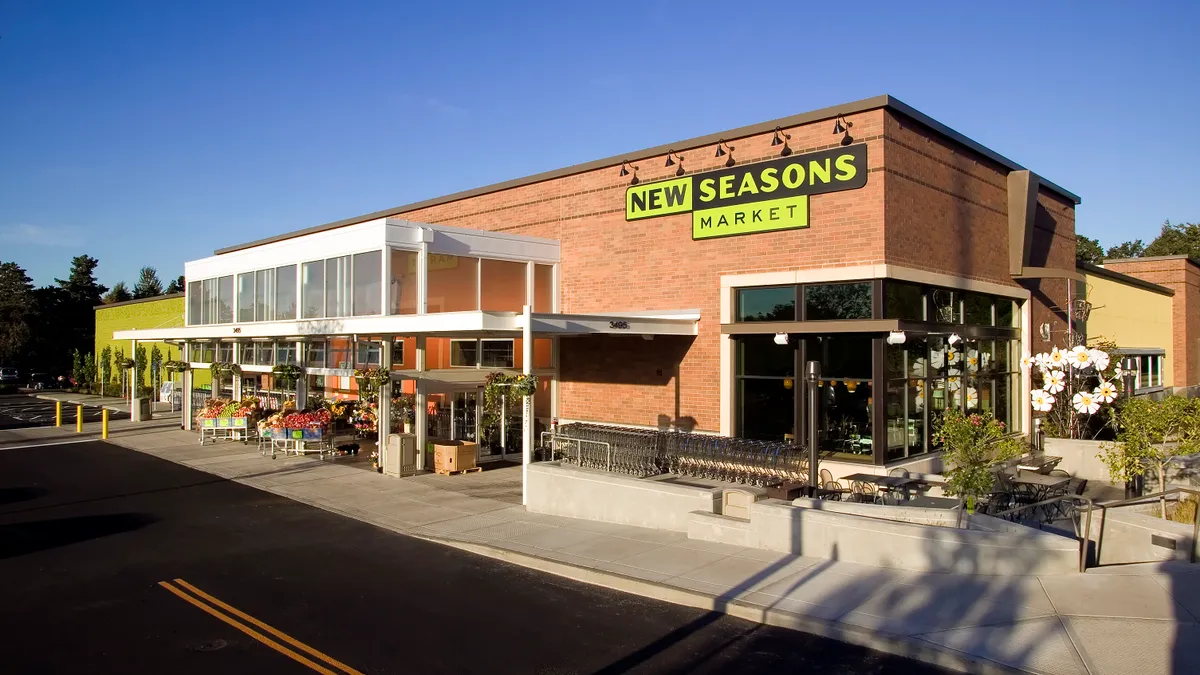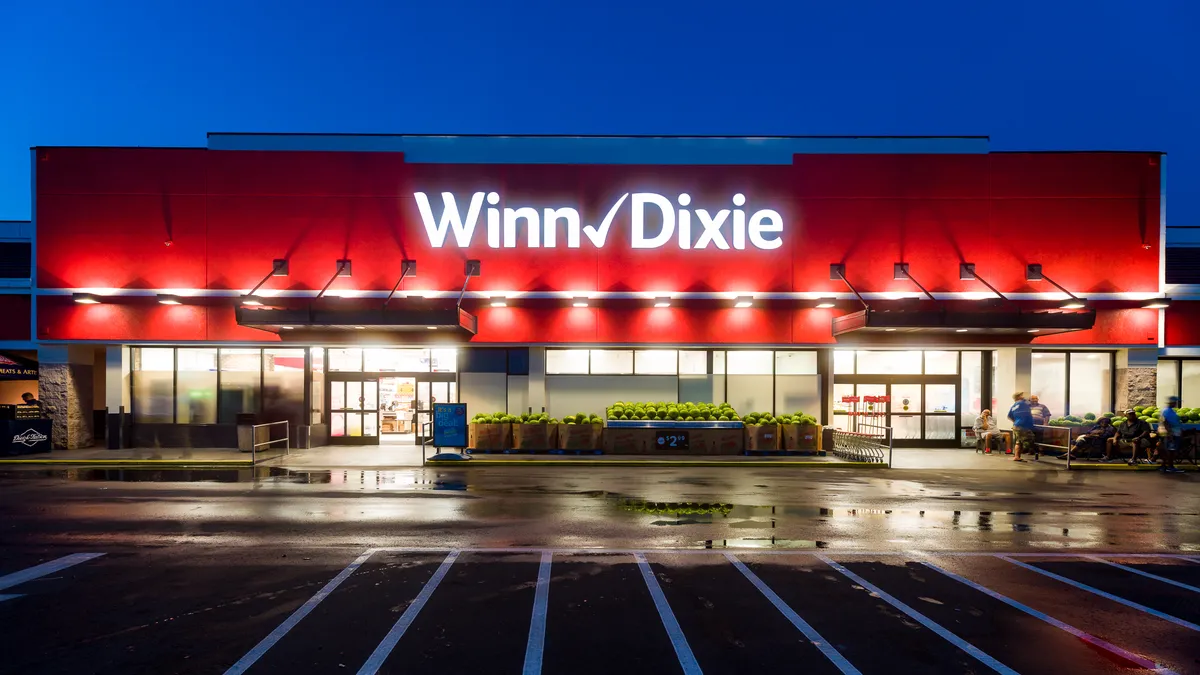In a digital-focused grocery industry where Amazon has become a serious brick-and-mortar competitor, chains that aren’t evolving their store technology are increasingly viewed as easy prey.
So how is it possible that a 78-store retailer that doesn’t even have a website is not only staying afloat but actually pummeling the competition?
Welcome to the world of Market Basket, a New England grocer that takes a seriously old-school approach to retailing. In addition to a lack of presence online, the company eschews the loyalty programs, mobile apps, digital coupons, emailed offers and other popular innovations that so many grocers have implemented in recent years. Only in the past year did Market Basket begin adding credit card readers for customers to use at checkout.
The old-fashioned touches don’t stop there. Numerous sources describe the store environment as being stuck in the ‘70s, complete with white-and-tan checkered flooring. Some people speculate the company had to convince its flooring provider to continue turning out the tiles, which it first started making decades ago.
With few of the usual amenities, what’s to like? Plenty, according to customers — including some of the lowest prices and best customer service around.
"You can depend on Market Basket to have lower prices pretty much all the time," John Rand, senior vice president of retail insights with Kantar Retail, told Food Dive. "They might get beat on a sale item in any given week, but their everyday prices are as good or better than everyone else's.”
Market Basket offers a case study in the virtues of tried-and-true retailing practices, and could hold lessons for grocers seeking to build customer loyalty in a hyper-competitive industry. The question now is whether the old-fashioned company can continue to win even as the rest of the industry transforms.
The Market Basket way
Most consumers and industry observers outside New England know Market Basket from a high-stakes family drama that unfolded three years ago.
The Demoulas family, which started Market Basket more than a hundred years ago in Lowell, Massachusetts, had for decades been engaged in a dispute over who controlled the company. The fight, which involved the families of the founder's two sons, George and Telemachus, became a back-and-forth legal battle. At times, it broke out into a raucous display like when two cousins, Arthur S. Demoulas and Arthur T. Demoulas, who became the company's president in 2008, came to blows during a court recess.
In 2013, George's son, Arthur S. and his side of the family gained enough board votes to oust the very popular Arthur T., who had maintained Market Basket's positioning as a high-volume, low-price retailer that also offered generous pay and benefits to its workers.
What happened next was unprecedented for a modern-day grocer: Employees and customers left the stores en masse, demanding Arthur T.'s reinstatement. For two months during the summer of 2014, Market Basket stores sat vacant while shoppers took their business to other stores, often posting their receipts on Market Basket store windows to show the company the business they were losing. In August of that year, the family sold the business to Arthur T. Demoulas for $1.5 billion, and Market Basket resumed operations.
"They might get beat on a sale item in any given week, but their everyday prices are as good or better than everyone else's.”

John Rand
Senior vice president, Kantar Retail
Because Arthur T. borrowed heavily to finance his purchase of the company, many speculated the debt-saddled Market Basket would emerge a different company. But according to numerous sources interviewed by Food Dive, the retailer returned to business as usual, and is even gaining strength.
“They never lost a step,” said Rand, who noted the company has accelerated its store growth recently. “When they came back, they came back, quite frankly, better than ever.”
A Market Basket spokesman did not respond to Food Dive's requests for an interview
“Maniacal” about keeping operating costs down
Key to Market Basket’s appeal are its prices, which typically beat competitors such as Stop & Shop, Shaws and even Walmart. The company achieves these market-beating prices in a number of ways, the most visible being a high-volume, “pile it high, let it fly” merchandising model. Shoppers, who come to the stores in droves, particularly on weekends, snap up products while employees roaming the aisles quickly restock shelves. Customers often joke that if they place an item in their cart, it’ll be replaced on the shelf by the time they reach the end of the aisle.
Market Basket is also “maniacal” about keeping operating costs down, according to Mike Berner, a former company employee and now an economist based in Boston. The lack of a company website is one notable example.
“They just don’t need it,” Berner, who worked for the company for several years during his high school and college years, told Food Dive. “Market Basket is something that people around here grow up with. Because it’s a regional chain, they’re not trying to get everyone else in the country to know about them.”
There is a website — mydemoulas.net — that posts weekly store circulars and company information, but it isn't affiliated with the company, and makes very clear to visitors that this is the case. The developer, Michael Devaney, registered the site several years ago, and according to a 2014 profile, he gets around 1.2 million unique page views per month.
According to Berner and others, Market Basket’s generous pay and employee bonuses — including a yearly Christmas bonus that goes to all employees — feeds into the company’s low-price platform. Many workers stick with the company, known for promoting a tight-knit culture, resulting in very low turnover. The company also tends to promote from within, meaning there are numerous managers with decades of experience negotiating low prices with suppliers and keeping stores running efficiently.
Market Basket’s worker-focused culture ensures good customer service, which in turn draws more shoppers to feed its high-volume model. The stores are clean, sources say, and products are always in stock and neatly arranged. Employees, who wear ties and jackets, are encouraged to assist customers whenever possible. According to Berner, workers are told to say, “I’m going to help you” rather than asking, “How may I help you?”
It’s this focus on execution and customer service, and not just low prices, that many believe accounts for Market Basket’s wide-ranging popularity. Laurin Mills, a frequent customer and president of The Dinner Daily, a service that compiles weekly meal plans using grocers’ store circulars, said Market Basket highlights the importance of price to most consumers, regardless of income.
Mills estimated that a week's worth of dinners for a family of five costs between $65 and $70 at Market Basket.
“I know plenty of people who have the disposable income to shop at Whole Foods, but they still go to Market Basket because the prices are so good,” she told Food Dive.
Keeping up with the times
Much of Market Basket’s success comes thanks to customers such as Anne Turcott of Westford, Massachusetts, a town northwest of Boston. She started visiting the grocer after moving to the area from Connecticut back in 1996, and has been a loyal customer ever since. She said the chain’s low prices are very appealing, but noted it’s the quality of their fresh meats and produce that seal the deal for her. As a mother of two kids with Celiac disease, she estimated she cooks fresh meals six out of seven nights a week.
“I’m a big outer rim shopper,” Turcott, 49, told Food Dive. “I don’t shop those middle aisles.
Despite Market Basket’s reputation for keeping things the same, Turcott said she’s noticed numerous changes to the retailer’s assortment, including an ever-widening selection of fresh fruits and vegetables, locally sourced meat and seafood and prepared meals. She said the assortment is just as good as other area chains and independent specialty stores, and doesn’t have the loyalty cards, online shopping and other added services she views as unnecessary.
There are tradeoffs, according to Turcott. Her store is often crowded, with “lots of shopping carts jockeying around.” Having employees constantly stocking shelves can be an impediment, as can the pallets they’ll often leave in the aisles for shoppers to navigate around. However, these obstacles are worth the quality and savings the chain offers, she said.
“I know plenty of people who have the disposable income to shop at Whole Foods, but they still go to Market Basket because the prices are so good.”

Laurin Mills
President, The Dinner Daily
According to industry observers, Turcott’s observations accurately track Market Basket’s merchandising and assortment evolution. Even though the company eschews pricey store technology, it has very much stayed on-trend with its offerings. The retailer now offers a wider assortment of fresh produce and meats than it did even a few years ago, including many locally sourced options, that cater to the changing tastes of the shopper.
Industry analysts say Market Basket also offers a top-notch choice of natural and organic products, including many gluten-free items.
“Right now, if you go into a Hannaford and a Market Basket, Market Basket is getting more natural and organic assortments than Hannaford is, and at a much lower price point,” Elley Symmes, an analyst with Kantar Retail, told Food Dive.
Market Basket provides an array of prepared foods in its Market Kitchen deli and foodservice department, including handmade sandwiches for less than $6. The chain also sells fresh wraps, pizzas, paninis, salads and burgers from the grill. According to Kantar Retail's Rand, the chain’s newest stores focus on offering a wide assortment of made-to-order and grab-and-go foods.
Market Basket also does its research, sources say, and makes sure its assortments reflect the tastes of its customers. This includes many ethnic communities where the chain operates.
“It’s not just about having Mexican food, it’s about having Brazilian and Ethiopian food, and speaking to all those demographics that have moved into the area around the stores,” Symmes said.
The future looks retro
Can Market Basket continue to win with price, service and a touch of nostalgia for the shopping experiences of yesteryear? Rand certainly believes so.
“What they’ve done is they’ve created authenticity," he said. "They give you the sense that they’ve kept up on what matters. They do a really good job at a lot of things you wouldn’t really associate with a store from the 1950s.”
Berner agrees, noting that Market Basket is not just a preferred shopping destination but a New England institution. Kids grow up visiting Market Basket, then often go on to work there and eventually shop at the store when they have their own families. Longevity and high customer loyalty, he said, are two hard-earned advantages that competitors will struggle to overcome.
“I think it would be very difficult to take away what Market Basket has built up, even if you’re Amazon,” Berner said.
At the same time, some observers agreed the lack of an online shopping option could eventually hurt Market Basket, particularly as low-price operators such as Walmart and Aldi expand their respective platforms. Rand, for one, believes the company likes to take a “wait and see” approach to technology, and will jump in once it sees undeniable benefits and a path to implementation.
“I think Market Basket is looking and thinking, we can afford to wait and see what the best model ends up being,” said Rand. “I don’t doubt they’ll join in when the time comes, but they’ll be conservative for now.”
Turcott, meanwhile, said she hasn’t seen any new offerings or services from competing retailers that would convince her to scale back her shopping at Market Basket. She said she’ll occasionally go to Whole Foods for its cheese selection. There’s also a specialty independent store in the area that offers high-quality produce along with wine tastings and other “bells and whistles,” according to her.
“But you also pay the higher prices,” she said. “I’d rather have the low prices.”



